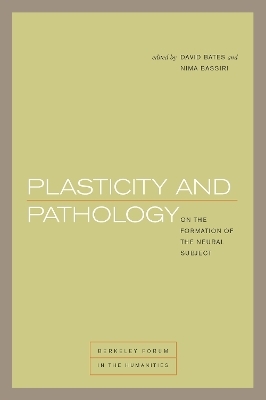
Plasticity and Pathology
On the Formation of the Neural Subject
Seiten
2016
Fordham University Press (Verlag)
978-0-8232-6614-2 (ISBN)
Fordham University Press (Verlag)
978-0-8232-6614-2 (ISBN)
This collection of essays explores the historical and theoretical dimensions of the contemporary neural subject. With a multidisciplinary perspective, the volume focuses attention on the important, but problematic notion of plasticity as a way of rethinking the relationship between human experience and both pathological and normal states of the nervous system.
With the rise of cognitive science and the revolution in neuroscience, it is now commonplace to assume that the study of a human person—a thinking, feeling, acting subject—is ultimately the study of the human brain. In both Europe and the United States, massive state-funded research is focused on mapping the brain in all its remarkable complexity. The metaphors employed are largely technological: A wiring diagram of synaptic connectivity will lead to a better understanding of human behavior and perhaps insights into the breakdown of human personhood with diseases of the brain such as Alzheimer’s. Alongside this technologized discourse of the brain as locus of human subjectivity we find another perspective, one that emphasizes its essential plasticity—in both the developmental sense and as a response to traumas such as strokes, tumors, or gunshot wounds.
This collection of essays brings together a diverse range of scholars to investigate how the “neural subject” of the twenty-first century came to be. Taking approaches both historical and theoretical, they probe the possibilities and limits of neuroscientific understandings of human experience. Topics include landmark studies in the history of neuroscience, the relationship between neural and technological “pathologies,” and analyses of contemporary concepts of plasticity and pathology in cognitive neuroscience. Central to the volume is a critical examination of the relationship between pathology and plasticity. Because pathology is often the occasion for neural reorganization and adaptation, it exists not in opposition to the brain’s “normal” operation but instead as something intimately connected to our ways of being and understanding.
With the rise of cognitive science and the revolution in neuroscience, it is now commonplace to assume that the study of a human person—a thinking, feeling, acting subject—is ultimately the study of the human brain. In both Europe and the United States, massive state-funded research is focused on mapping the brain in all its remarkable complexity. The metaphors employed are largely technological: A wiring diagram of synaptic connectivity will lead to a better understanding of human behavior and perhaps insights into the breakdown of human personhood with diseases of the brain such as Alzheimer’s. Alongside this technologized discourse of the brain as locus of human subjectivity we find another perspective, one that emphasizes its essential plasticity—in both the developmental sense and as a response to traumas such as strokes, tumors, or gunshot wounds.
This collection of essays brings together a diverse range of scholars to investigate how the “neural subject” of the twenty-first century came to be. Taking approaches both historical and theoretical, they probe the possibilities and limits of neuroscientific understandings of human experience. Topics include landmark studies in the history of neuroscience, the relationship between neural and technological “pathologies,” and analyses of contemporary concepts of plasticity and pathology in cognitive neuroscience. Central to the volume is a critical examination of the relationship between pathology and plasticity. Because pathology is often the occasion for neural reorganization and adaptation, it exists not in opposition to the brain’s “normal” operation but instead as something intimately connected to our ways of being and understanding.
David Bates (Author) David Bates is Professor and Chair in the Department of Rhetoric at the University of California, Berkeley. He is the author of States of War: Enlightenment Origins of the Political. Nima Bassiri (Author) Nima Bassiri is Collegiate Assistant Professor in the Humanities and Harper- Schmidt Fellow in the Society of Fellows at the University of Chicago. His research on the history of neuroscience has been published in journals such as Critical Inquiry and Journal of the History of Ideas.
| Reihe/Serie | Berkeley Forum in the Humanities |
|---|---|
| Zusatzinfo | 8 Black & White Illustrations |
| Verlagsort | New York |
| Sprache | englisch |
| Maße | 152 x 229 mm |
| Themenwelt | Geisteswissenschaften ► Philosophie |
| Medizin / Pharmazie ► Allgemeines / Lexika | |
| Medizin / Pharmazie ► Medizinische Fachgebiete ► Neurologie | |
| Naturwissenschaften ► Biologie ► Humanbiologie | |
| Naturwissenschaften ► Biologie ► Zoologie | |
| ISBN-10 | 0-8232-6614-1 / 0823266141 |
| ISBN-13 | 978-0-8232-6614-2 / 9780823266142 |
| Zustand | Neuware |
| Haben Sie eine Frage zum Produkt? |
Mehr entdecken
aus dem Bereich
aus dem Bereich
interdisziplinäre Diagnose- und Behandlungsstrategien
Buch | Hardcover (2024)
Urban & Fischer in Elsevier (Verlag)
97,00 €
Material für visuell Lernende
Buch | Softcover (2023)
Kohlhammer (Verlag)
44,00 €


